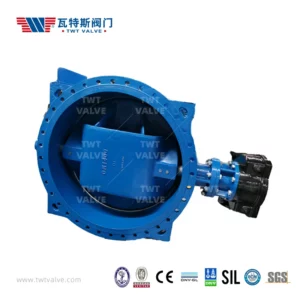Sure! Eccentric butterfly valves are commonly used in a variety of industrial applications where precise flow control and high flow capacity are required.
Here are some examples of specific applications where eccentric butterfly valves are commonly used:
Oil and Gas Industry: Eccentric butterfly valves are often used in the oil and gas industry for applications such as crude oil pipelines, gas pipelines, and refining processes. They can handle high flow rates and are well-suited for applications where fluids may contain solids or debris.
Chemical Processing: Eccentric butterfly valves are commonly used in chemical processing plants for applications such as corrosive chemical transfer, mixing, and blending. They are highly resistant to corrosion and can handle a wide range of chemicals.
Water Treatment: Eccentric butterfly valves are used in water treatment plants for applications such as raw water intake, sludge handling, and wastewater treatment. They are effective at handling fluids with high solids content and can help reduce energy consumption and maintenance costs.
HVAC Systems: Eccentric butterfly valves are used in heating, ventilation, and air conditioning (HVAC) systems for applications such as air flow control and temperature regulation. They can handle high flow rates and offer precise control of fluid flow.
Power Generation: Eccentric butterfly valves are used in power generation plants for applications such as boiler feedwater, cooling water, and steam control. They can handle high temperatures and pressures and offer precise control of fluid flow.
These are just a few examples of the many applications where eccentric butterfly valves are commonly used. The specific application will depend on the requirements of the process, and the specific features and capabilities of the valve.
How do eccentric butterfly valves compare to other types of valves in terms of cost and performance?
The cost and performance of an eccentric butterfly valve compared to other types of valves will depend on the specific application and requirements.
However, here are some general comparisons:
Cost: In general, eccentric butterfly valves tend to be less expensive than other types of valves, such as globe valves or ball valves. This is because they have a simpler design and require less material to manufacture.
Performance: Eccentric butterfly valves offer several advantages over other types of valves. They have high flow capacity, low pressure drop, and can handle fluids with high solids content. They are also easy to operate and require minimal maintenance. However, they may not be suitable for all applications, such as those that require precise flow control or tight shutoff.
Versatility: Eccentric butterfly valves are versatile and can be used in a wide range of applications, including oil and gas, chemical processing, water treatment, HVAC systems, and power generation.
Durability: Eccentric butterfly valves are durable and can handle a range of temperatures and pressures. They are also highly resistant to corrosion, which can extend their lifespan and reduce maintenance costs.
When selecting a valve for a specific application, it’s important to consider factors such as the required flow rate, pressure, temperature, fluid characteristics, and other performance requirements. The initial cost of the valve is also an important consideration, but the long-term costs of maintenance and replacement should also be taken into account.
